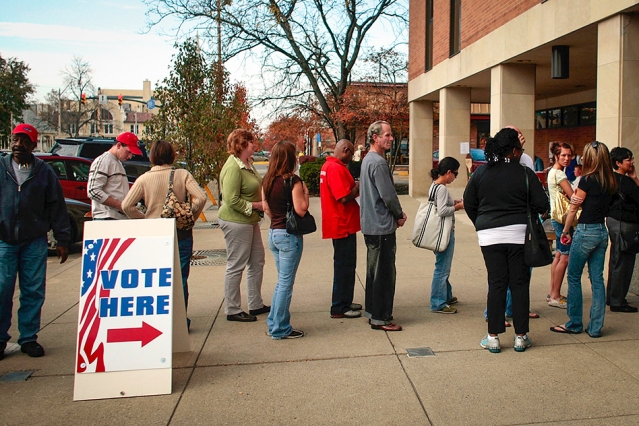Campus political groups encourage students to vote
October 18, 2018
Editor’s Note: Claire Wallace, The News’ deputy lifestyle editor, is the political director for Northeastern University College Democrats. She in no way contributed to the production of this article.
It may come as a surprise, but Northeastern’s political clubs are focused on non-partisan outreach in the weeks leading up to the midterms.
The NU College Democrats, or NUCD, and the NU College Republicans, or NUCR, say they attempt to strike a careful balance between supporting their respective parties’ candidates and maintaining an ideologically inclusive environment within their organizations.
Citizenship Above Party
While neither organization officially endorses political candidates on campus, both emphasize helping students fulfill their civic duty to vote.
Over the past two weeks, NUCD held tabling events to help potential voters in several ways, said Yael Sheinfeld, NUCD’s director of communications.
“We’ve been registering students to vote, checking registration status and printing out absentee ballot request forms,” said Sheinfeld, a second-year English and communications studies combined major. “We offer to mail those in for students as well to cut the middle steps out so that it’s a lot less tedious and a lot less time consuming to register to vote.”
NUCD president Hannah Pettit believes this additional level of assistance to is crucial to make sure students to follow through with the voting process.
“A lot of people register to vote, but they don’t take the next step and request an absentee ballot because it requires a stamp and a deadline,” said Pettit, a third-year cell and molecular biology major. “That’s where college students perhaps could fall off and not vote.”
So far, Sheinfeld estimates that the Democrats have registered 30 students and collected and mailed between 20 to 30 absentee ballots during three brief tabling events.
Sheinfeld said a segment of the young adult population doesn’t fully understand the consequences of the election, making her organization’s role increasingly important.
“There’s a really weird split among millennials where a lot of people are very engaged — more so than they ever have been due to the circumstances,” Sheinfeld said. “And a lot of people still don’t really care because it really doesn’t affect them yet. They don’t pay taxes and they don’t own property.”
NUCR president Noah Tagliaferri agrees with NUCD on the importance of voter participation.
“We’re very active in voter registration and we’ve done tabling events,” said Tagliaferri, a third-year information science and philosophy double major. “That’s something that the College Democrats do as well and I think that’s important regardless of party.”
While Pettit says the Democrats’ tabling efforts elicit a generally positive response, Tagliaferri accepts that the Republicans will not always get the same warm reception, but believes the student population leans more to the right than some would expect.
“It is what is,” he said. “You get called names. I’ve had things thrown at me. This is a pretty liberal campus, but there are more conservatives than here than people think.”
Political science professor and campaign analyst Costas Panagopoulos said groups like NUCD and NUCR play a “crucial role” in engaging young people in the electoral process beyond voting.
“[Student political groups] can also be instrumental in directing students to opportunities to volunteer on campaigns or in coordinating campus events designed to inform students about the views and policy positions of the candidates,” said Panagopoulos in an Oct. 17 email to The News.
Inclusive and impartial
Notably, both organizations hesitate to give official endorsements of candidates, but connect members with any party campaign in need of volunteers.
“We have a policy as a club of not taking a stance,” Tagliaferri said. “We present opportunities to get involved and let members do as they see fit.”
Similarly, Sheinfeld says that NUCD does not officially endorse candidates during Democratic primaries. However, members often volunteer for campaigns as individuals.
Although partisan, both clubs claim to embrace varied viewpoints within their respective party ideology.
“There’s a population of people who are more traditionalist, but then there are people who want to shoot for the stars — who loved Bernie. We definitely do have a spectrum,” Pettit said.
Tagliaferri likened his club’s membership to that of the broader GOP.
“The Republican Party as a whole is not one single view,” said Tagliaferri. “We have libertarian Republicans, social conservatives, socially-liberal Republicans.”
Tipping the scales
While NUCD remains relatively impartial during the primaries, the club leverages its resources to support Democrats across the country in contested general elections.
“We focus less of our time on [local races] because we see tighter races like Beto O’Rourke versus Ted Cruz,” Sheinfeld said. “Those are polar opposite people, so for us, it’s super crucial to use our time and energy as much as possible to make sure that Ted Cruz does not have a seat anymore and that we can replace him with somebody who is so drastically different.”
As a NUCD member who joined before the 2016 election, Pettit observed a marked increase in involvement and interest among her fellow members and in the campus community.
“People are motivated,” Pettit said. “Although I’m not super happy with what’s going on in DC, the best thing that’s come out of it is the fact that people are engaged and people don’t just accept this for what it is.”
Sheinfeld wants to capitalize upon her members’ renewed political fervor.
“We’re college students. We’re angry, we’re engaged, we have the most time and the most flexibility,” Sheinfeld said. “We’re willing to do crazy things to get shit done.”







